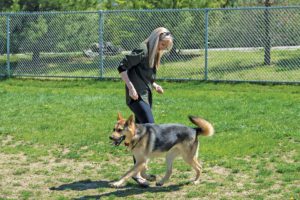
HSHV director Tanya Hilgendorf with the German Shepherd she’s fostering. Like many dogs adopted during the pandemic, she suffers from severe separation anxiety.
“It was a good time to be a homeless animal,” says Huron Valley Humane Society director Tanya Hilgendorf of the pandemic.
“We definitely had huge increases in adoption in 2020,” adds HSHV dog behaviorist Angela Schmorrow. “We had pretty much empty hallways here because everybody wanted a pet to hang out with while they were home.”
The dogs were down with that. But now that their people are going back to work, some are suffering psychologically.
“I myself have a foster dog who has separation anxiety,” Hilgendorf says. “She’s on medication, and we’re working with the trainer, but she broke through a window. She didn’t hurt herself, but she broke through a window!
“The dog basically has a panic attack,” Hilgendorf explains. “They become destructive in the house. They may eliminate in the house. But they also can hurt themselves. They can engage in chewing their paws or their body parts.”
“Those are the pretty extreme cases,” says Schmorrow, “but certainly every dog can have separation anxiety and present in different ways. I think the more common is the kind of silent sufferer who, if you watch them on videotape, spends the day pacing, drooling, sitting by the door, whining, barking, and just generally stressed out.
“The good news is with separation anxiety there are some pretty well-established protocols that are helping dogs feel better while alone,” says Schmorrow who is also co-owner of Harmony Dog Training. “And they have shown to be quite effective.”
“But it is work,” she explains. “And probably the hardest thing for people is that the most successful protocols … require some period of time upfront where the owners can make arrangements to not leave the dog alone at all.
“In the short term, we make a management plan with the owner. “Can you work from home? Can you leave the dog with a friend, family member, neighbor when you do have to go to work? Can you bring the dog to work with you? Can they go be a doggy daycare?
“In the meantime, they work on just desensitizing the dog to gradually starting to feel comfortable with the things predicting absences, like putting your shoes on, grabbing the keys, walking to the door, and then building up to very short durations,” she continues. “Then as they get used to that, looking comfortable, no longer getting stressed, you can start pushing it for a little bit longer.
“If they work through the desensitization protocol, we often see good outcomes in the long run, so ultimately they can go back to work or leave the house and the dog’s comfortable.”
Two methods of dealing with separation definitely don’t work. “One of the recommendations that is often made [is people] should go get a second dog,” Schmorrow says. “But usually dogs with separation anxiety are distressed about being away from their people and having another pet in the home is not necessarily going to resolve it. So I always tell people it’s not gonna fix things, and they’re running risk that they end up with two animals with separation anxiety!”
The other method is even worse. “People sometimes can get frustrated with their dogs or say things like ‘they’re just being spiteful because they’re mad that I’m leaving,’ ” says Schmorrow. “They’re not trying to be spiteful or vindictive. They’re really freaking out!”
“When you use punishment—yelling, hitting, rubbing their nose in the ground, whatever it is—it’s not productive,” agrees Hilgendorf. “You just create more fear and anxiety in addition to being inhumane towards an animal that can’t defend itself!”
Hilgendorf would like to see a different solution: “Everybody should be able to bring their animals to work. Obviously they have to be relatively well behaved, but wouldn’t everybody be happier with animals around?”
“It can be potentially great depending on the work environment and the dog,” says Schmorrow. “Taking a shy, nervous dog to a very busy, loud, active work environment could in fact be really stressful for an animal. If you have a dog that is actually perfectly content to sleep on the couch alone, then being left at home might be a better option for that individual dog than if they’re gonna be nervous in a stressful work environment.
“But if you have a dog that gets very stressed alone and you have a quiet office and your dog’s comes there and is comfortable with the people in the work environment, then it could be great. It’s probably a nice stress reducer for the humans as well.”

